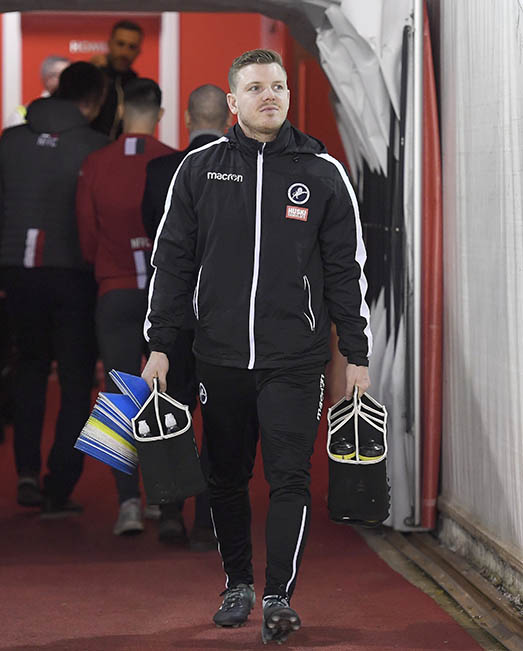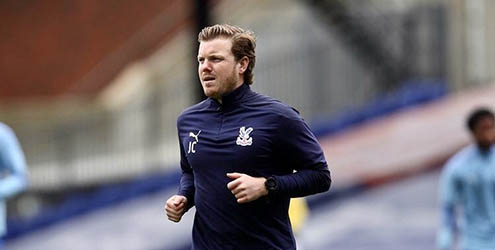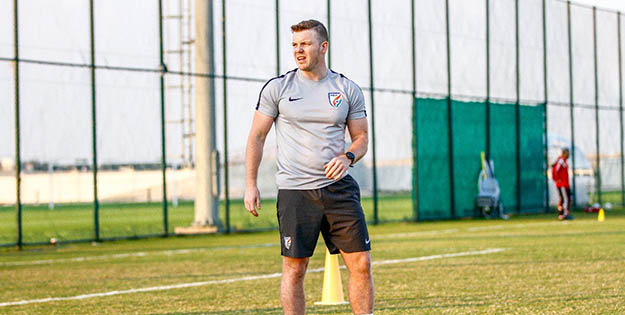Career
Copyright@ Australian Catholic University 1998-2026 | ABN 15 050 192 660 CRICOS registered provider: 00004G | PRV12008
Copyright@ Australian Catholic University 1998-2026 | ABN 15 050 192 660 CRICOS registered provider: 00004G | PRV12008

Every day that Joel Carter walks into work at Crystal Palace FC, he’s in awe of the level of detail that goes into preparing athletes for the English Premier League: the world-class facilities, the cutting-edge technology, the pursuit of new knowledge and approaches to gain a competitive edge.
It’s a dream job for the football-mad sports scientist. Sometimes, he has to pinch himself to make sure that it’s true.
But is he surprised that he reached his goal of working with a top-flight football club so early on in his career?
“To be honest with you, yes and no,” says Joel, who took on his role as the senior performance coach at the Crystal Palace Academy in mid-2020. “I have a lot of belief in myself, and I made a load of sacrifices to get to this point.”
Joel was in his teens when he first got a taste of what good training can provide for an athlete. As a talented young centre-midfielder moving up the ranks in Sydney representative football, he enjoyed a rapid boost in performance when his strength and fitness work was on point.
“I really immersed myself in it and the more I trained, the stronger and better I got,” says Joel, who played for several local clubs including Sydney United, as well as a yearlong stint in Barcelona, Spain. “I was doing five sessions a week and a game on the weekend, and that resulted in some really steep improvements in my playing.”
As he got to his late teens, however, injuries started to take their toll. As much as he loved playing football, his hopes of forging a professional career were fading.
Late in his playing career, Joel engaged his “fallback plan” to go into sports coaching. He enrolled in a Bachelor of Exercise and Sports Science at ACU and set himself a new career goal: to work alongside elite athletes in the English Premier League.

Joel at Crystal Palace.
“It probably goes back to when I was younger and staying up until three or four in the morning to watch the games, because I always wanted to be a Premier League player,” says Joel, who commenced his bachelor’s degree in 2013.
“Once I got to ACU, I developed an idea in my head that if I wasn’t going to be playing football, it would have to be the next best thing, and that meant being involved in a coaching capacity.”
The transition from football player to budding coach wasn’t all smooth sailing for Joel.
As an athlete who was focused squarely on the practical elements of sport and performance, moving into the theory of human movement was a challenge.
“I had to learn about things like biomechanics, anatomy and motor control, things that I didn’t have much of an attachment to when I was so football-oriented in high school,” he says.
Things started to get easier when he was able to apply his new knowledge to his own experiences as a sportsperson.
“I realised that my downfall as a player was not having the support of real-time sports science and conditioning – things that would definitely have helped with my strength, power and injury prevention,” says Joel, now 28.
“I suddenly had this overwhelming need to answer the question of why my body broke down in those circumstances, and then I began to look more deeply into the robustness of athletes, how we can maximise athletic potential and keep people on the playing surface for a longer period of time.”
Under the tutelage of ACU lecturer Dr Craig Duncan, Joel worked hard and began to thrive at university and in his industry placements, which included working with netballers at GWS Fury, the canoeing and kayaking team at the Australian Institute of Sport, and a return to football as a strength and conditioning coach with the Western Sydney Wanderers youth team.
After completing his bachelor’s degree, he pursued postgraduate study with ACU’s Master of High Performance Sport, combining the high-level degree with coaching roles for the Warringah Rugby Club and Barker College.
He got his first big break when he moved to Asia to work with the All India Football Federation, where he designed and implemented an evidence-based sports science program for the national men’s side.

“That was a big move and a great experience,” Joel says. “Finally I was able to apply all the things I’d learnt in a professional football setting, and it was really rewarding to see the effect it had on the athletes.”
At the end of his contract, he was left with a choice: he could return home to Sydney, or he could take a chance and head to England to pursue his dream.
“I didn't have a job lined up either way, but I knew I had a strong focus on the pursuit of making it in English football, so I decided to take a punt.”
Joel’s gamble paid off quickly. Three months after arriving in the UK, he landed a job with English Football League outfit Millwall.
Although he had to start from scratch as an assistant sports scientist with the club, he soon transitioned into a first-team role, with the task of ensuring that players were physically prepped for championship games.
A year later, Joel saw an opportunity to move to Crystal Palace, and though he was happy at Millwall, the chance of working with a top-flight club was too good to refuse.
Joel is currently in charge of getting Palace players ready for the rigours of the Premier League as they transition through the professional phase of the academy, from the under 18s to the under 23s and into the first team.
He says he’s constantly taken aback by the professionalism within the club.
“The level of detail is really jaw-dropping,” says Joel, who labels his move to Palace as “a fantastic opportunity”.
“The standards and expectations of the club are extremely high, and it’s a great chance for me push the boundaries even further. It’s something that’s excited me since joining the club and it still excites me every day.”
As for his long-term goals, Joel insists he’s “not getting too carried away”.
“My passions lie with maximising athletic potential and I’m forever grateful for this opportunity at Palace, so I’m solely focused on getting better at what I do.”
Maybe, one day, he’d like to work with athletes competing at the pinnacle of global sport: the FIFA World Cup.
“I'd love to do that, particularly if it was with the Socceroos,” he says. “But in the short term I’m very much focused on enjoying myself at Crystal Palace, continuing to work hard to learn and improve, and to see where that takes me.”
Keen to study sport and exercise science at ACU? Explore the options.
Copyright@ Australian Catholic University 1998-2026 | ABN 15 050 192 660 CRICOS registered provider: 00004G | PRV12008